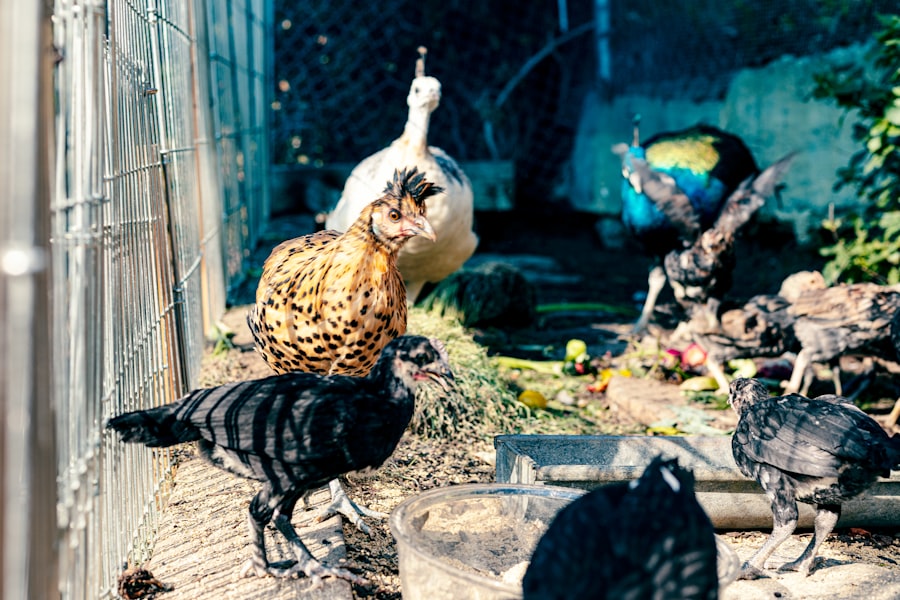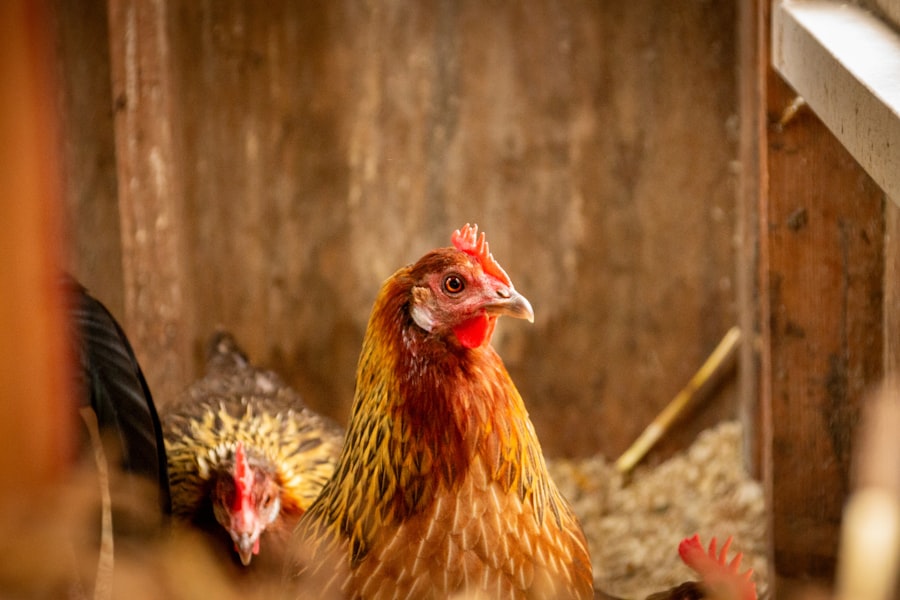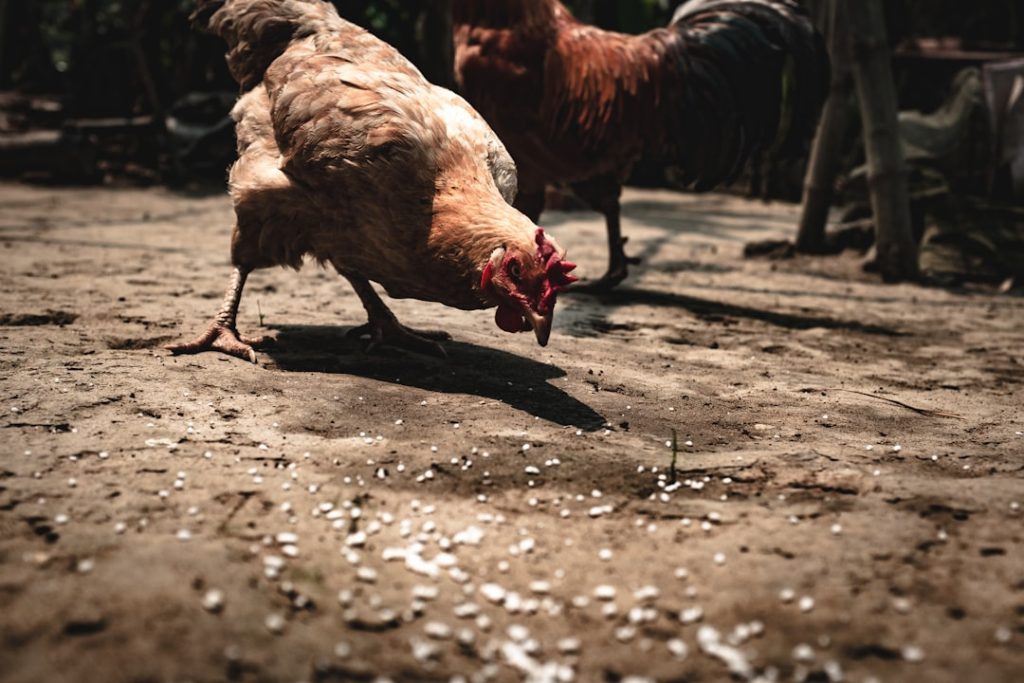Weasels are small carnivorous mammals belonging to the Mustelidae family. They possess elongated bodies and short legs, enabling swift movement through confined spaces. These skilled hunters can overpower prey significantly larger than themselves.
Their diet consists of small mammals, birds, eggs, and insects. Weasels are renowned for their cunning and stealthy nature, making them challenging to detect and capture. Primarily nocturnal, weasels are most active during nighttime hours, which can complicate efforts to observe them raiding chicken coops.
They exhibit strong territorial behavior, fiercely defending their hunting grounds. Weasels are proficient climbers, capable of scaling fences or walls to access chicken coops. Their digging abilities also allow them to burrow beneath barriers.
Understanding weasel behavior and habits is essential for developing effective strategies to safeguard chickens from these predators. Weasels’ intelligence and adaptability make them a significant threat to chicken coops. Their hunting prowess enables them to circumvent many deterrents.
Implementing proactive measures to secure chicken coops is crucial for protecting flocks from these cunning predators.
Table of Contents
- 1 Securing the Chicken Coop
- 2 Implementing Deterrents and Traps
- 3 Using Guard Animals
- 4 Keeping the Surrounding Area Clear
- 5 Monitoring and Inspecting Regularly
- 6 Seeking Professional Help if Necessary
- 7 FAQs
- 7.1 What are weasels and why do they pose a threat to chickens?
- 7.2 What are some effective methods for keeping weasels away from chickens?
- 7.3 Are there any natural predators of weasels that can help keep them away from chickens?
- 7.4 What should I do if I suspect that weasels are targeting my chickens?
- 7.5 Are there any natural deterrents that can help keep weasels away from chickens?
Key Takeaways
- Weasels are small, agile predators known for their ability to enter small spaces and prey on chickens and other small animals.
- Securing the chicken coop with sturdy materials and ensuring all entry points are sealed can help prevent weasel attacks.
- Implementing deterrents such as strong-smelling substances and setting up traps can help keep weasels away from the chicken coop.
- Using guard animals such as dogs or geese can help deter weasels from approaching the chicken coop.
- Keeping the surrounding area clear of debris and overgrown vegetation can reduce hiding spots for weasels and make it easier to spot any potential threats.
- Regular monitoring and inspection of the chicken coop can help identify and address any potential vulnerabilities to weasel attacks.
- Seeking professional help from pest control experts or wildlife removal services may be necessary if weasel infestations persist despite preventive measures.
Securing the Chicken Coop
Securing Openings and Doors
Use sturdy materials such as hardware cloth or welded wire to cover windows, vents, and other openings. Ensure that doors are fitted with secure latches and cannot be easily pushed open.
Preventing Digging and Climbing
Consider installing an apron of wire mesh around the perimeter of the coop to prevent weasels from digging underneath. This should extend at least 12 inches outward and be buried several inches into the ground to deter burrowing. Additionally, adding a roof to the chicken run can prevent weasels from climbing over the fence and gaining access to the coop from above.
Maintaining a Safe Environment
It is also important to keep the area around the coop free from clutter and debris that could provide cover for weasels. Trim back any overgrown vegetation and remove any piles of wood or brush that could serve as hiding spots for predators. By securing the chicken coop and eliminating potential entry points, you can greatly reduce the risk of weasel attacks on your flock.
Implementing Deterrents and Traps

In addition to securing the chicken coop, implementing deterrents and traps can help further protect your flock from weasel attacks. One effective deterrent is the use of predator urine or scent repellents around the perimeter of the coop. Weasels are territorial animals and may be deterred by the presence of a larger predator’s scent.
Commercially available predator urine or scent repellents can be applied to the ground or sprayed around the coop to create a barrier that weasels may be reluctant to cross. Another effective deterrent is the use of motion-activated lights or sound devices near the coop. Weasels are nocturnal animals and may be startled by sudden light or noise, causing them to flee the area.
These devices can help deter weasels from approaching the coop and reduce the risk of an attack. Traps can also be an effective tool in controlling weasel populations around the chicken coop. Live traps can be baited with eggs or meat and placed near potential entry points to capture weasels without harming them.
Once captured, weasels can be relocated to a more suitable habitat away from the coop. It is important to check traps regularly and release any non-target animals unharmed. By implementing deterrents and traps, you can create an additional layer of protection for your flock and reduce the risk of weasel attacks on your chicken coop.
Using Guard Animals
Another effective strategy for protecting your chickens from weasel attacks is to use guard animals. Certain animals, such as dogs or geese, can serve as effective deterrents against weasels and other predators. Dogs are natural predators and can help keep weasels at bay by patrolling the area around the coop and deterring potential threats.
Geese are also known for their aggressive nature and loud honking, which can help deter weasels from approaching the coop. When selecting a guard animal, it is important to choose a breed that is known for its protective instincts and ability to coexist with chickens. Introduce guard animals to the flock gradually and monitor their interactions to ensure they do not pose a threat to the chickens themselves.
By using guard animals, you can add an extra layer of protection to your chicken coop and reduce the risk of weasel attacks.
Keeping the Surrounding Area Clear
Keeping the surrounding area clear of potential hiding spots for weasels is essential in reducing the risk of attacks on your chicken coop. Weasels are skilled at using cover to remain undetected while hunting, so it is important to eliminate any potential hiding spots near the coop. Keep the area around the coop free from tall grass, brush, or debris that could provide cover for weasels.
Regularly mow the grass and trim back vegetation to create a clear line of sight around the coop. This will make it more difficult for weasels to approach undetected and reduce the risk of an attack on your flock. By keeping the surrounding area clear, you can make it more challenging for weasels to hunt near the coop and protect your chickens from potential threats.
Monitoring and Inspecting Regularly

Inspecting the Coop
Inspect the coop regularly for any signs of damage or wear that could provide an entry point for weasels. Check for gaps in walls or fences, loose boards, or holes in the ground that could allow weasels to gain access.
Monitoring Weasel Activity
Monitor the area around the coop for any signs of weasel activity, such as tracks or droppings. Keep an eye out for any unusual behavior in your flock, such as increased agitation or signs of stress, which could indicate a potential threat from weasels.
Staying Proactive
By monitoring and inspecting regularly, you can stay ahead of potential issues and take proactive measures to protect your flock from weasel attacks.
Seeking Professional Help if Necessary
If despite your best efforts, you continue to experience problems with weasels attacking your chicken coop, it may be necessary to seek professional help. Wildlife experts or pest control professionals can provide valuable insight and assistance in developing effective strategies for managing weasel populations around your property. Professional help may involve implementing more advanced trapping techniques, such as using lethal traps or snares under strict regulations.
Wildlife experts can also provide guidance on habitat modification and other long-term strategies for reducing weasel activity around your property. By seeking professional help if necessary, you can gain access to specialized knowledge and resources that can help you effectively manage weasel populations and protect your chickens from potential threats. In conclusion, understanding weasels and their behavior is crucial in developing effective strategies for protecting your chicken coop from these cunning predators.
By securing the coop, implementing deterrents and traps, using guard animals, keeping the surrounding area clear, monitoring and inspecting regularly, and seeking professional help if necessary, you can greatly reduce the risk of weasel attacks on your flock. With proactive measures in place, you can create a safe and secure environment for your chickens to thrive without fear of predation from weasels.
If you’re looking for more tips on keeping your chickens safe, you might be interested in an article on Poultry Wizard about what vegetables quails eat. Quails can be a great addition to your poultry flock, and knowing what they can eat can help you plan your garden and feeding routine. Check out the article here.
FAQs
What are weasels and why do they pose a threat to chickens?
Weasels are small, carnivorous mammals that are known for their ability to hunt and kill chickens. They are a threat to chickens because they can easily fit through small openings in chicken coops and are skilled at preying on poultry.
What are some effective methods for keeping weasels away from chickens?
Some effective methods for keeping weasels away from chickens include securing chicken coops with sturdy wire mesh, ensuring that there are no gaps or openings that weasels can squeeze through, and using motion-activated lights or sound devices to deter them.
Are there any natural predators of weasels that can help keep them away from chickens?
Some natural predators of weasels include larger carnivorous mammals such as foxes, coyotes, and birds of prey. Encouraging the presence of these predators in the area can help keep weasels away from chickens.
What should I do if I suspect that weasels are targeting my chickens?
If you suspect that weasels are targeting your chickens, it is important to take immediate action to secure your chicken coop and protect your poultry. This may involve reinforcing the coop with wire mesh, setting traps for the weasels, or seeking assistance from a professional pest control service.
Are there any natural deterrents that can help keep weasels away from chickens?
Some natural deterrents that can help keep weasels away from chickens include the use of strong-smelling substances such as predator urine or ammonia, as well as the presence of guard animals such as dogs or geese. Additionally, keeping the area around the chicken coop clear of debris and overgrown vegetation can help reduce the likelihood of weasel activity.
Meet Walter, the feathered-friend fanatic of Florida! Nestled in the sunshine state, Walter struts through life with his feathered companions, clucking his way to happiness. With a coop that’s fancier than a five-star hotel, he’s the Don Juan of the chicken world. When he’s not teaching his hens to do the cha-cha, you’ll find him in a heated debate with his prized rooster, Sir Clucks-a-Lot. Walter’s poultry passion is no yolk; he’s the sunny-side-up guy you never knew you needed in your flock of friends!







